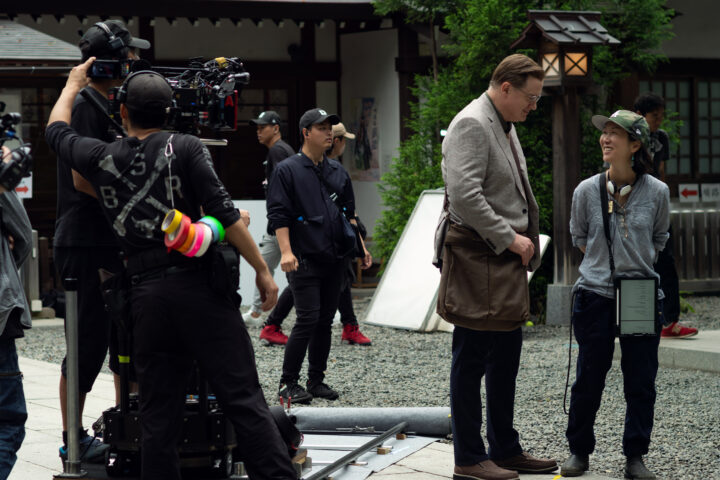Cruelty inflicted as much on the audience as its characters, The Killing of a Sacred Deer is an absurdist nightmare, a morality play lacking any trace of recognizable human behavior and a chore to experience once you realize that director Yorgos Lanthimos is playing little more than an elaborate game of mannered chess. It isn’t shocking, thoughtful or particularly engaging—it’s a boring turn-off that exists in a twilight zone of labored, intentional monotony that quickly becomes tiresome.
Describing the plot won’t explain what it is like to experience the picture’s tone of ice-cold detachment, but Colin Farrell is mild-mannered doctor David Murphy, who in the picture’s opening shot, is conducting an open heart surgery in close-up. He’s married to optometrist Anna, and they live in an expansive home in a pretty, well-to-do suburb with teen daughter Kim (Raffey Cassidy) and adolescent son Bob (Sunny Suljic).
On the surface, a typical American family—but there are secrets, including David’s clandestine connection with teen Martin (Barry Keoghan), the son of a former patient who died on the operating table. Perhaps out of guilt or maybe as a surrogate father of sorts, he indulges a relationship with the boy, his family and colleagues unaware of their meetings. On one professional occasion he lies about their relationship.
Complications ensue when David introduces Martin to his family, and the outsider quickly upsets the balance by trying to ingratiate himself into each of their worlds—shades of Pasolini’s Teorema—which is the beginning of the end for this picture-perfect household.
Not that it was every perfect. David, who enjoys kinky sexual games with Anna, is also prone to a flirtation with Martin’s mother (Alicia Silverstone, feeling out of place here) and some sort of shared history. And then there are suspicions of his secret drinking, which has been suspected during surgery.
The plot is set in motion when Marin declares to David that, as a form of moral retribution for David’s role (and perhaps unpunished negligence) in his father’s death, he has, in a sense, cursed each member of David’s family to die horribly—paralysis followed by an inability to eat and then profuse bleeding until death.
Just go with it. Lanthimos can’t be bothered to explain how this might practically work. It’s all a metaphor, you see, so physiological details and logic are unimportant as long as we see the gushing blood and understand that the sins of the fathers are being visited on the sons. Got it.
The ultimatum David faces? As Martin describes, he can sacrifice one of his family members to atone, after which they can call it even. Of course, David rejects the kid’s outrageous proposition. But when young Bob is suddenly unable to walk and admitted to the hospital, the hands of fate have been set in motion. You can imagine the ugliness to come—the marriage disintegrates, the children’s lives are suddenly in jeopardy and the only way to come clean is the unthinkable. Talk about a lose-lose situation.
It’s not much better for the audience. Superbly shot with clinical, cool precision, The Killing of a Sacred Deer is as visionary a picture as Lanthimos’ last two films, Dogtooth (another offbeat picture about a family shielding their children from the outside world) and The Lobster, a witty satire which was Oscar-nominated for its subversively screenplay.
But unlike those pictures, this time Lanthimos delivers one cold mind-fuck of a movie and gives us little reason to care. And since everyone onscreen, robotic to a fault, seems as if they don’t either, what is the point, exactly?
If the film has any consolation it might be found in Nicole Kidman, who gives so much of herself (everything, it seems, including her entire body) to this bizarre experiment you can’t help but want to follow her, even when Lanthimos clearly has no sincere intention of exploring what truly makes her character tick.
By contrast, the usually excellent Farrell (terrific in Lanthimos’ The Lobster) seems hamstrung by the stylization and in the playing, for much of the movie, a deliberately inexpressive character. Thanks to Lanthimos and for perhaps the first time in his career, he seems boring—the opposite of their last collaboration.
And young Irish actor Barry Keoghan (also in this year’s Dunkirk) delivers a performance of such calculated artifice it’s impossible to take him seriously as anything but a repellant catalyst for comeuppance.
The lockstep climax of the film involves a shotgun and a game of would-be Russian roulette that plays, like everything in this picture, as an elaborate stunt.
In The Killer of a Sacred Deer, there is simply no reason to care.
2 stars.



